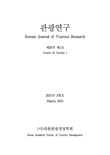학술논문
웰니스 시대의 음식관광 글로벌화 방안
이용수 387
- 영문명
- Food Tourism Globalization of the Wellness Era - Focusing of Motivation and Decision -
- 발행기관
- 대한관광경영학회
- 저자명
- 성연(Sung, Yeon)
- 간행물 정보
- 『관광연구』제30권 제1호, 141~162쪽, 전체 22쪽
- 주제분류
- 사회과학 > 관광학
- 파일형태
- 발행일자
- 2015.03.30
5,440원
구매일시로부터 72시간 이내에 다운로드 가능합니다.
이 학술논문 정보는 (주)교보문고와 각 발행기관 사이에 저작물 이용 계약이 체결된 것으로, 교보문고를 통해 제공되고 있습니다.

국문 초록
웰니스 흐름의 음식관광 글로벌화를 위해 음식관광 동기의 세분화를 통해서 음식관광동기 세분화를 통해서 글로벌화 전략방안을 제시 한다는 전제하에 연구에 임하였다. 연구대상은 음식관광을 위해서 음식점을 방문하는 외래 관광객을 모집단으로 하고 표본은 음식관광을 위해서 대구시에서 선정한 음식관광전문점의 외래 관광객을 대상으로 2013년 8월 1일에서 동월15일까지 2주간 450부의 설문지를 배포하였으며 설문방법은 (사)한국조리사 중앙회 대구지회의 협조로 작성법과 설문교육을 실시하고 편의표본추출법으로 자료를 수집?분석 하였다. 설문회수는 425부가 회수 되었으며(회수율94.4%), 교차타당성을 검정한 결과 Kendall’s tau 값이 음수인 부적절한 응답자의 자료 25부를 제외한 400부가 본 연구의 최종분석에 사용되었다. 연구결과로는 음식관광동기를 군집별 분류를 하였을 때 ‘동기가 높은 군집’(군집1)은 경험, 흥미, 웰니스, 영양지식의 순으로 음식관광동기 요인점수를 나타냈고, ‘동기가 중간인 군집’(군집2)은 웰니스, 휴식, 경험, 흥미순의 음식관광동기 요인점수를 나타냈으며 ‘동기가 낮은 군집’(군집3)에서는 경험, 웰니스, 적성 순으로 음식관광동기 요인 점수를 나타냈다. 음식관광 의사에 영향을 미치는 음식관광 동기는 흥미, 이미지, 영양지식, 경험, 휴식순의 영향력을 갖는 5개 동기 요인만이 유의하였으며 음식관광동기의 흥미요인은 2.557배 이미지요인은 2.29배, 영양지식은 1.7배, 경험은 1.645배, 휴식은 1.641배 증가 되어야 음식관광의사가 1단계 높아지는 것으로 나타났다. 이러한 연구결과는 음식관광객의 다양한 활동범위를 특성에 따른 선택으로 전략방안을 제시함으로서 음식관광동기의 특성 분류별 새로운 전략을 수립하는 중요한 기초자료가 될 것이다.
영문 초록
Through the segmentation of the food tourism motivation for globalization of food tourism wellness flow studies were being presented under the assumption that you need food tourism globalization strategies. The subjects in all groups a potential tourists and food specimens from the same month a 2 weeks 450 questionnaires 15 days from august 1, 2013 as a potential tourists who live in Dae-gu and the general life of 10 selected in Dae-gu, ‘ Food tourism food shop’. Survey methods Korea cooks federation of cartography and survey conducted in cooperation with education branch cod collecting data extraction and analyzed by convenience sampling. Questionnaire recovery portion 425 was recovered(recovery rate 94.4%). Cross-validation test results of Kendall"s tau value was negative except for a base 25 respondents inappropriate. In this study, 400 were used to add the final analysis.The results were classified into food tourism motivations three groups. 1 clustering (high clustering) is the experienced, interest, Wellness, nutrition knowledge, food tourism motivation scores showed the order, two clusters (intermediate clustering) are Wellness, relax, experienced, interest, order food in a tourist motivation score showed three clustering (low clustering) showed the experienced, wellness, food tourism motivation aptitude score order. Food tourism motivation has an effect on the intention of the food tourism was interesting, image, nutrition knowledge, experienced, relax, order in only five motivational factors mentioned significance, interest in food tourism motivation factor is 2.557 times the image factor is 2.29times, nutritional knowledge factors in 1.7times , experience factor 1.645 times, 1.641 times the relaxation factor, should be willing to increase food tourism showed higher step 1. As a result, the proposed strategic plan to widen the range of choice of food tourists tourism activities. Will be basis for establishing the characteristics of the new strategy classifieds food tourism motivation.
목차
요약
Ⅰ. 서론
Ⅱ. 이론 배경의 연구
Ⅲ. 연구방법론
Ⅳ. 실증분석
Ⅴ. 결론 및 시사점
참고문헌
Abstract
키워드
해당간행물 수록 논문
- Impacts of Place Attachment, Satisfaction, Loyalty and Age on Attitudes toward McDonald’s and Repurchase Intentions
- 서비스회복기대가 고객 회복 만족 및 기업이미지, 브랜드 충성도에 미치는 영향에 관한 연구
- 웰니스 시대의 음식관광 글로벌화 방안
- 여행의 실존적 진정성, 모더니티와 미적 경험의 관계에 관한 이론 연구
- 도시 브랜드 증거를 통한 방문객의 브랜드 개발 과정 탐색
- 전시 컨벤션 혜택이 소속감 및 고객 시민 행동에 미치는 영향
- 관광지 스토리텔링 모바일 어플리케이션 사용의도에 관한 연구
- SWOT-AHP를 이용한 그린투어리즘 활성화 전략에 관한 연구
- 항공사 공항서비스 인카운터 종사자의 메이크업 유행선도력이 자기효능감 및 서비스수행에 미치는 영향
- 객실승무원 취업준비생의 항공사 선택요인에 관한 연구
- CVM을 이용한 한류의 경제적 가치평가 연구
- 컨벤션센터 모바일 관광정보 사용에 있어 기대일치가 사용자만족과 구전의도에 미치는 영향에 관한 연구
- 관광산업에서의 대통령 마케팅의 사례연구
- 강원도 지역신문 기사를 활용한 강릉단오제에 대한 미디어인식 및 미디어 효과에 관한 연구
- 항공사 객실승무원이 지각한 라인팀관리자의 감성지능이 팀원 직무성과와 팀 성과에 미치는 영향
참고문헌
관련논문
사회과학 > 관광학분야 BEST
더보기사회과학 > 관광학분야 NEW
- Is this the time to brace for the return of Chinese tourists? Focusing on different risks and uncertainty perceptions
- Do tourists perceive the same risks in border tourism? The case of destinations along the U.S.-Mexico border
- 5성급 호텔의 인공지능 서비스 로봇 이용객의 행동의도에 미치는 영향관계에 대한 연구
최근 이용한 논문
교보eBook 첫 방문을 환영 합니다!

신규가입 혜택 지급이 완료 되었습니다.
바로 사용 가능한 교보e캐시 1,000원 (유효기간 7일)
지금 바로 교보eBook의 다양한 콘텐츠를 이용해 보세요!





